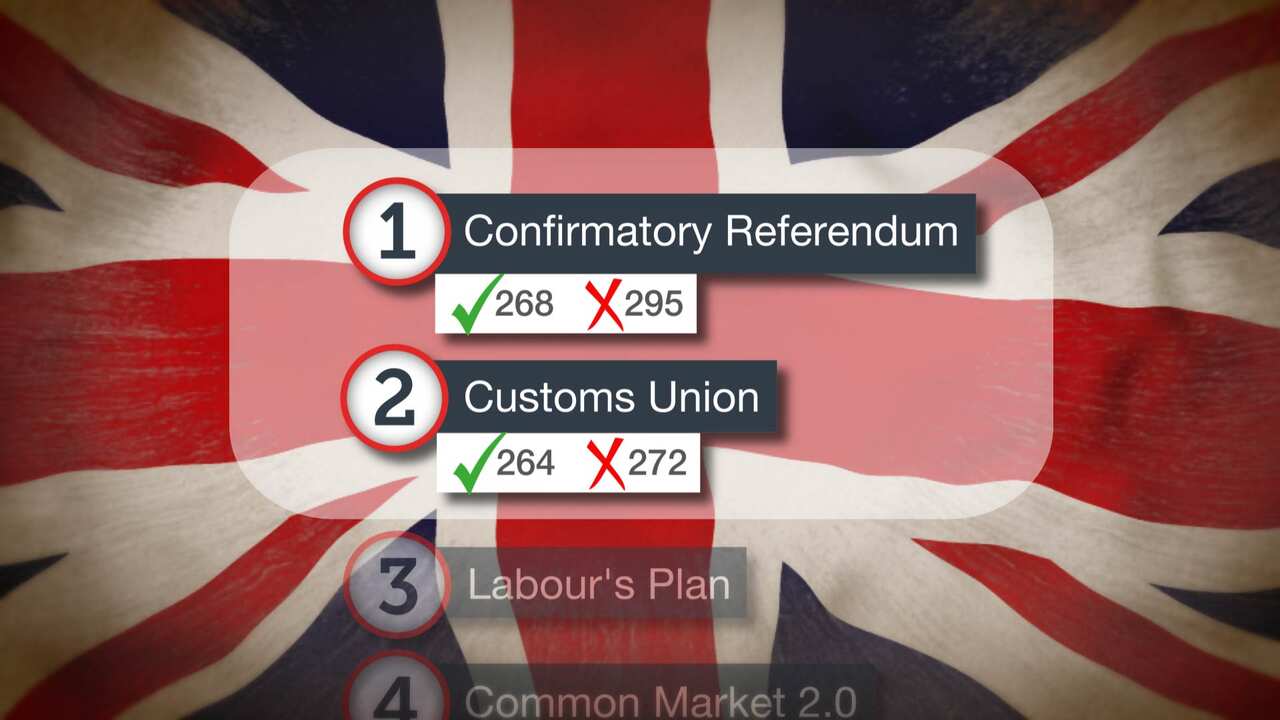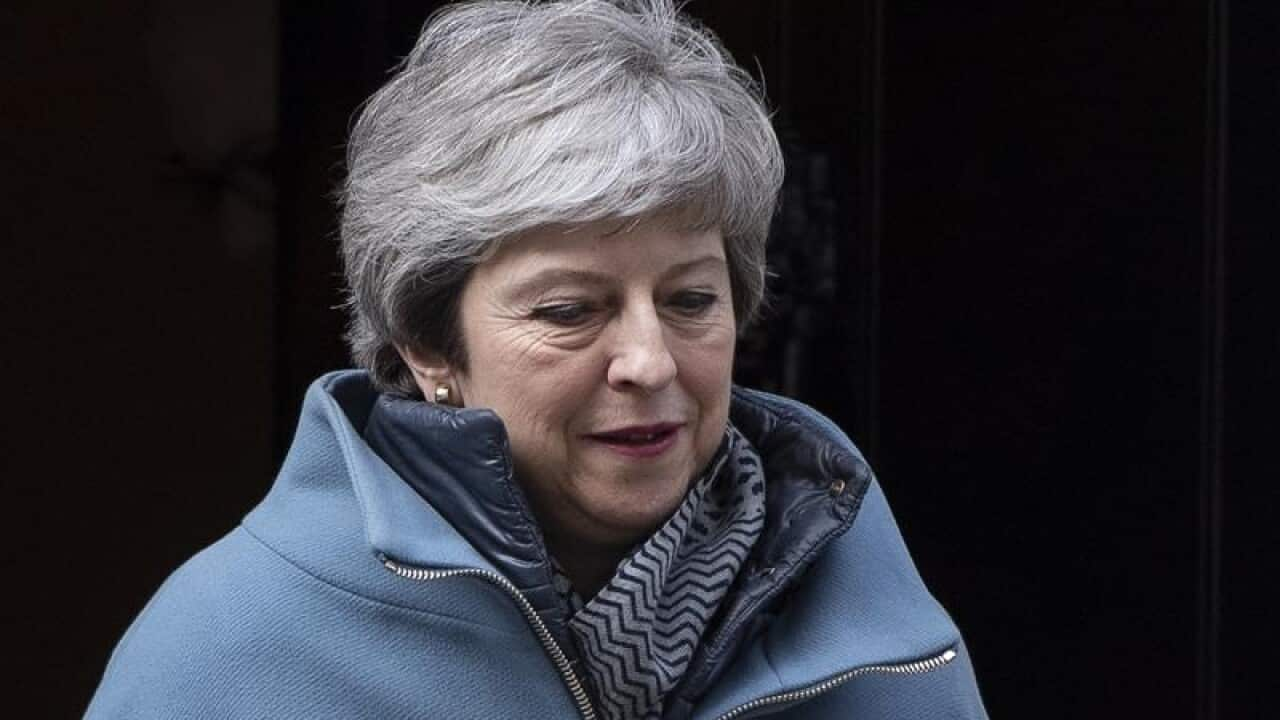British MPs have failed to reach an alternative Brexit deal again, rejecting all eight options for divorcing from the European Union.
The vote chaos comes after Prime Minister Theresa May announced she will step down if MPs approve her Brexit deal.
The embattled Conservative leader has faced growing calls to resign over the political crisis that has gripped Britain for months, and which forced her to ask the EU last week to delay Brexit by a fortnight.
With many MPs now pressing for a longer extension or even to reverse the whole process, Ms May has made one last attempt to secure support for the divorce deal she has struck with Brussels.
So all the indicative votes have told us is that MPs can't agree on any single course of Brexit. None of the 8 options put forward were approved by the house. @SBSNews — Ben Lewis (@benlewismedia) March 27, 2019
She told MPs in her Conservative party on Wednesday that she would not "stand in the way" of new leadership for the "second phase of Brexit negotiations" - although did not spell out when exactly this would be, or what she would do if her deal was rejected.

"I know there is a desire for a new approach – and new leadership – in the second phase of the Brexit negotiations - and I won't stand in the way of that," she told a meeting of the Conservative Party's backbench 1922 Committee.
"I am prepared to leave this job earlier than I intended in order to do what is right for our country and our party," she added, according to a press release from her Downing Street office.
Theresa May's announcement will win over a lot of Brexiteer Conservative MPs. But will it be enough for the DUP? Their problem, after all, was to do with the Irish backstop. @SBSNews — Ben Lewis (@benlewismedia) March 27, 2019
Conservative MP James Cartlidge, who was at the closed-door meeting, told reporters as he walked out that Ms May had said she would step down before the "next phase" of Brexit negotiations.
Fellow MP Pauline Latham told reporters the PM had said she would resign "after the meaningful vote was through", meaning the vote on her EU divorce deal.
"We have to pass it or all bets are off," Ms Latham said.

Several MPs who voted against the deal have suggested they could now back it if Ms May gave a timetable for her resignation, allowing a new leader to head the negotiations over Britain's future relationship with the EU.
"I know some people are worried that if you vote for the Withdrawal Agreement, I will take that as a mandate to rush on into phase two without the debate we need to have. I won't - I hear what you are saying," Ms May said.
"But we need to get the deal through and deliver Brexit."

'Time to move on'
Ms May has in the past won praise for her determination and ability to survive an extraordinary period of political turmoil since the Brexit vote but has now come under fire over her handling of Britain's messy departure from the EU.
In support of May, Finance Minister Philip Hammond said she had "demonstrated once again that she puts getting an orderly Brexit done ahead of everything else."
"She put the country's interests first," Scottish Tory MP Luke Graham told AFP.

Chief Secretary to the Treasury Liz Truss said Ms May "cares deeply about our country and is a patriot.
"People must now support the deal and move us forward," she said.
But the PM’s approach to the endgame - refusing to accept that MPs did not like her deal and delaying Brexit to keep trying to push it through - has prompted deep frustration and anger on all sides.
Opposition Labour leader Jeremy Corbyn said her pledge to stand down "shows once and for all that her chaotic Brexit negotiations have been about party management, not principles or the public interest".
Scottish First Minister Nicola Sturgeon said the deal was "so bad that the PM has to promise to resign to get it through", adding that Ms May's promise would "make an already bad project even worse".
Ms May has all but lost control of her government, with ministers from both the pro- and anti-Brexit camps joining scores of Conservative MPs in defying the government in parliamentary votes.
At the weekend, after another humiliating Brussels summit, British newspapers were full of reports of moves by her colleagues to oust her.

The Conservative-supporting Spectator magazine suggested Ms May was the "worst prime minister in our history", condemning her "lack of imagination, inability to lead a team or solve complex problems".
'Maybot'
Despite having campaigned to stay in the EU, Ms May then embraced the cause once she took office with the mantra "Brexit means Brexit".
Her promise to leave the EU's institutions and end free movement of workers delighted eurosceptic MPs, but caused dismay among many pro-Europeans.
The splits in her Conservative party became a serious problem after she called a snap election in June 2017 and ended up losing her parliamentary majority.
She was forced to strike a deal with Northern Ireland's pro-Brexit Democratic Unionist Party (DUP), and since then has struggled to keep her party and its allies together.
Naturally reserved and reliant on her husband Philip and a few close aides, the PM says she is just quietly "getting on with the job".
But in the last election, she struggled to engage with voters and was dubbed the "Maybot" after churning out the same answers and speeches over and over again.
No unity candidate
The question now is whether Ms May's gamble succeeds - and who might succeed her.
Ms May has faced repeated challenges since taking office, with figures such as former foreign minister Boris Johnson constantly challenging her authority.
But she won a leadership challenge within her own party in December, even if she had to promise to quit before the next scheduled election in 2022.
Ms May's critics are hampered by their own divisions, and have so far failed to unite behind a rival candidate.
After British MPs failed to find a majority for any Brexit alternative and Ms May offered to resign if parliament backed her own plan, what could happen next?
Britain is left with four general directions: back a deal, go for no deal, negotiate a long delay to work out a new strategy or stop Brexit altogether.
Those options could entail various courses of action, all of which appear to lead either to Prime Minister Theresa May's departure or a general election - or both.
Leave with deal on May 22
British MPs have twice rejected, by overwhelming margins, a draft divorce agreement struck between London and Brussels in November last year.
A new vote on the agreement, which allows for a long transition period and time for trade ties to be negotiated, will only be brought forward if it has sufficient support to pass.
In a desperate gamble to get the deal over the line, May told her MPs that she will resign before the start of full-blown trade negotiations with the EU if they back it.
If that works, Britain would leave the European Union on May 22, and May would step down some time in the summer.
Several contenders have been mooted to replace May, among them David Lidington, Michael Gove, Boris Johnson, Jeremy Hunt, Sajid Javid and Dominic Raab.
No-deal Brexit on April 12
If the deal is not passed, and no other course of action can be agreed, the default option would be that Britain crashes out of the EU without a deal.
This could generate economic shockwaves on both sides of the Channel and cause severe delays at border points, despite preparations to mitigate these risks.
The European Commission on Monday said this option was "increasingly likely" and announced that its no-deal Brexit preparations have been completed.
May has not ruled out the possibility of a no-deal, though MPs have voted against ever leaving without a deal.
New plan, long Brexit delay
MPs held "indicative votes" on Wednesday on a range of alternative Brexit options that could rip up the withdrawal agreement and remove some of May's red lines, such as ending freedom of movement.
But none of the eight options - which included staying in the EU customs union and revoking Article 50 altogether - achieved a majority, although they are expected to try again on Monday.
If no course of action can be agreed, Britain could ask EU leaders for another, much longer delay ahead of the current deadline of April 12.
That would mean it would have to hold European Parliament elections at the end of May.
The European Commission, the EU's executive arm, has advised EU leaders that this longer extension should be at least until the end of 2019 and possibly much longer to allow for a proper change in Brexit strategy.
The longer delay would also allow time for a change in prime minister if May quits.
It would open up other options too such as holding a general election or, perhaps, a second referendum.
Britain's Electoral Commission has budgeted for European elections and could hold them at short notice but May has said it would be "unacceptable" to take that route.
Stop Brexit
This is by far the least likely option but is still a possibility.
Between 500,000 and one million marchers are estimated to have flooded London on Saturday calling for a second referendum on EU membership.
The European Court of Justice has ruled that Britain could unilaterally revoke its Article 50 notification - the formal procedure for leaving the EU.
General election
If the stand-off between parliament and government persists, May could call a general election.
It would reset parliament and a clear outcome with a government majority could result in a much stronger administration.
However, for both major parties, finding a clear Brexit manifesto that all their MPs can commit to could prove a challenge.

